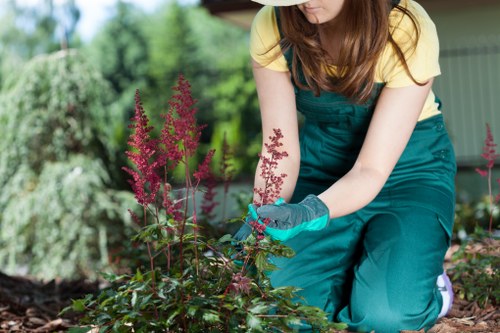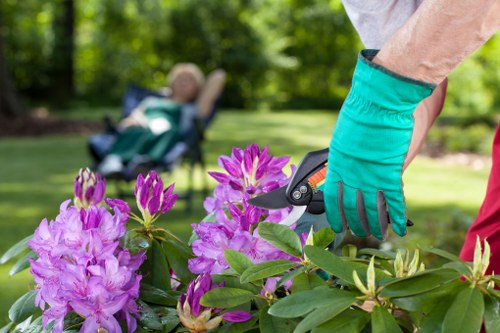Effective Driveway Algae Removal in Richmond upon Thames

Algae growth on driveways is a common problem, especially in the damp climate of Richmond upon Thames. Not only does it make your driveway look unsightly, but it can also cause slipperiness, posing safety risks for you and your family. Understanding the causes, prevention methods, and effective removal techniques is essential for maintaining a clean and safe driveway.
Algae thrive in shaded, moist environments, making driveways surrounded by trees and plants particularly susceptible. The dark, damp conditions provide an ideal breeding ground for algae spores, leading to persistent growth if not addressed promptly.
Fortunately, there are several strategies you can employ to remove algae from your driveway and prevent its return. From chemical treatments to eco-friendly solutions, choosing the right method depends on your specific situation and preferences.

Understanding Algae Growth
Algae are simple plants that require minimal nutrients to grow. On your driveway, they feed on moisture, organic debris, and shade. Common types of driveway algae include:
- Green Algae: The most common type, green algae give surfaces a mossy appearance.
- Black Algae: More resistant to cleaning, black algae can penetrate porous surfaces, making removal more challenging.
- Red Algae: Less common but still problematic, red algae can discolor driveways and surrounding areas.
Understanding the type of algae affecting your driveway can help in selecting the most effective removal method.

Causes of Algae on Driveways
Several factors contribute to the growth of algae on driveways:
- Moisture: Constant dampness from rain, dew, or improper drainage provides the necessary environment for algae growth.
- Shade: Areas that receive limited sunlight, often due to surrounding trees or structures, remain moist longer.
- Organic Debris: Leaves, dirt, and other organic matter can retain moisture and provide nutrients for algae.
- Porous Surfaces: Driveways made of concrete, paving stones, or tiles are more prone to algae growth as their surfaces trap moisture.
Addressing these underlying causes is crucial for long-term prevention and maintenance.

Effective Algae Removal Methods
Choosing the right algae removal method depends on the extent of the growth and the type of driveway surface. Here are some proven techniques:
1. Chemical Treatments
Commercial algae removers are widely available and can be effective in eliminating existing growth. These typically contain bleach or other chemical agents that kill algae spores. However, it's essential to follow the manufacturer's instructions carefully to avoid damaging your driveway or harming surrounding vegetation.
2. Eco-Friendly Solutions
If you prefer a more environmentally friendly approach, consider using vinegar or baking soda. These natural remedies can be effective for light to moderate algae growth. Mix vinegar with water in a 1:1 ratio and apply it to the affected areas, scrub gently, and rinse thoroughly.
3. Pressure Washing
For stubborn algae, a pressure washer can provide a deep clean. The high-pressure water jets remove algae and embedded dirt. However, use caution to avoid damaging the driveway surface, especially if it's made of softer materials.
4. Preventive Maintenance
Regular maintenance is key to preventing algae from returning. This includes sweeping away organic debris, ensuring proper drainage, and trimming surrounding vegetation to increase sunlight exposure.

Preventing Future Algae Growth
After successfully removing algae, taking preventive measures can help keep your driveway clean and safe:
- Improve Drainage: Ensure that water doesn't pool on your driveway by fixing drainage issues and maintaining proper slopes.
- Trim Vegetation: Reducing shade by trimming trees and shrubs allows more sunlight to reach your driveway, making it less hospitable for algae.
- Regular Cleaning: Sweep your driveway regularly to remove leaves and debris that can retain moisture.
- Seal the Surface: Applying a sealant can create a barrier that makes it harder for algae to take hold.
Implementing these preventive measures will extend the time between cleanings and maintain the appearance of your driveway.

Choosing a Professional Algae Removal Service
If the algae problem is extensive or you're unsure about handling it yourself, hiring a professional service in Richmond upon Thames can be a wise decision. Professionals have access to specialized equipment and expertise to effectively remove algae without damaging your driveway.
- Assessment: A professional will assess the extent of the algae growth and identify any underlying issues contributing to the problem.
- Customized Solutions: They can recommend the best treatment methods tailored to your specific driveway and circumstances.
- Efficiency: Professionals can often remove algae more quickly and thoroughly than DIY methods.
- Maintenance Plans: Some services offer ongoing maintenance to prevent future growth, ensuring your driveway remains clean and safe.
Investing in professional services can provide peace of mind and long-lasting results.

Cost of Algae Removal
The cost of algae removal in Richmond upon Thames can vary based on several factors:
- Driveway Size: Larger driveways require more time and materials, increasing the overall cost.
- Extent of Growth: Heavy algae infestations may need more intensive treatment, driving up expenses.
- Chosen Method: Chemical treatments, pressure washing, and professional services each come with different price points.
- Additional Repairs: If algae have caused damage to the driveway surface, additional repair costs may be necessary.
On average, homeowners can expect to spend between £100 and £300 for professional algae removal services, but prices can vary. Getting multiple quotes can help you find a service that fits your budget.

DIY vs. Professional Removal
Deciding between DIY methods and hiring a professional depends on your comfort level, the severity of the algae problem, and your budget.
DIY Methods
Pros:
- Cost-effective
- Immediate control over the process
- Use of readily available materials
Cons:
- Less effective for severe infestations
- Potential risk of damaging the driveway
- Time-consuming
Professional Services
Pros:
- Thorough and effective removal
- Expertise and specialized equipment
- Long-term preventive solutions
Cons:
- Higher cost
- Dependence on service availability
In many cases, especially for large or stubborn algae problems, professional removal is the more efficient and reliable option.

Environmental Considerations
When dealing with algae removal, it's important to consider the environmental impact of the methods you choose:
- Chemical Cleaners: While effective, these can harm plants and animals if not used correctly. Always follow label instructions and protect surrounding vegetation.
- Eco-Friendly Solutions: Natural remedies like vinegar and baking soda are safer for the environment and non-toxic to wildlife.
- Water Usage: Pressure washing uses significant amounts of water, which can be a concern in areas with water restrictions. Consider using water-efficient techniques.
Choosing environmentally safe methods helps protect local ecosystems in Richmond upon Thames and ensures compliance with local regulations.

Local Regulations and Guidelines
Operating within local regulations is crucial when performing algae removal in Richmond upon Thames. Here are some key considerations:
- Disposal of Chemicals: Ensure that any chemical waste is disposed of properly to avoid environmental contamination.
- Water Usage Regulations: Be aware of any local restrictions on water usage, especially when using pressure washing techniques.
- Permits: Some methods may require permits, particularly if they involve large-scale or commercial-grade treatments.
- Noise Ordinances: If using machinery like pressure washers, adhere to local noise regulations to avoid disturbances.
Staying informed about and compliant with Richmond upon Thames' local laws ensures that your algae removal efforts are both effective and lawful.

Best Time to Remove Algae
Timing your algae removal efforts can enhance effectiveness and minimize regrowth:
- Spring and Early Summer: Algae thrive in warmer temperatures and higher humidity. Starting removal in spring can prevent extensive growth before the hotter months.
- After Heavy Rainfall: Removing algae after significant rain can be beneficial as it flushes out algae spores, making the removal process easier.
- Regular Maintenance: Scheduling consistent cleanings throughout the year helps keep algae at bay and maintain driveway cleanliness.
Planning your algae removal during optimal periods ensures better results and reduces the likelihood of recurring issues.

Equipment Needed for Algae Removal
Having the right tools can make the algae removal process more efficient:
- Protective Gear: Gloves, goggles, and masks protect you from chemicals and debris.
- Cleaning Agents: Depending on your chosen method, you might need bleach, vinegar, baking soda, or commercial algae removers.
- Brushes and Scrubbers: Sturdy brushes help in scrubbing off algae effectively.
- Pressure Washer: For those opting for pressure washing, ensure you have access to a suitable machine.
- Buckets and Hoses: Necessary for mixing solutions and rinsing the driveway.
Preparing your equipment ahead of time streamlines the cleaning process and ensures you can tackle algae efficiently.

Health and Safety Tips
Algae removal can involve certain risks. Observing health and safety guidelines is essential:
- Protective Clothing: Wear gloves and eye protection to shield against chemicals and debris.
- Ventilation: If working in confined spaces, ensure adequate ventilation to avoid inhaling fumes from cleaning agents.
- Proper Handling of Chemicals: Store and handle all cleaning agents according to the manufacturer’s instructions to prevent accidents.
- Safe Use of Equipment: Follow operational guidelines for any machinery, like pressure washers, to prevent injuries.
- First Aid: Keep a first aid kit handy in case of accidental exposure or injuries.
Prioritizing safety ensures that your algae removal process is not only effective but also risk-free.

Case Studies: Success Stories in Richmond upon Thames
Many homeowners in Richmond upon Thames have successfully tackled driveway algae problems using a combination of the methods discussed. Here are a couple of examples:
Case Study 1: John’s Eco-Friendly Approach
John noticed significant algae growth on his concrete driveway. Preferring an environmentally safe method, he used a mixture of vinegar and baking soda. After applying the solution and scrubbing with a stiff brush, the algae were effectively removed. Regular maintenance and trimming nearby shrubs prevented recurrence.
Case Study 2: Sarah’s Professional Solution
Sarah had persistent black algae on her stone driveway. Despite multiple DIY attempts, the problem persisted. She hired a local professional algae removal service, which used a specialized chemical treatment and pressure washing. The result was a clean driveway, and the professional team provided a maintenance plan to keep algae at bay.
These success stories highlight the effectiveness of both DIY and professional approaches, depending on the severity of the algae issue.

Local Areas in Richmond upon Thames Benefiting from Algae Removal
Richmond upon Thames is surrounded by several areas where homeowners experience similar algae issues. Addressing algae in these regions ensures a cohesive approach to property maintenance across the borough. Some of the closest areas include:
- Twickenham: Known for its lush parks, Twickenham faces algae challenges similar to Richmond due to high vegetation.
- Kew: With the famous Kew Gardens, Kew's shaded driveways often require regular algae cleaning.
- East Sheen: Residential areas with plenty of trees contribute to the moist conditions favorable for algae growth.
- Mortlake: Proximity to the River Thames means higher humidity levels, promoting algae development.
- Putney: Urban driveways in Putney also contend with algae, especially in shaded, humid spots.
- Richmond Hill: The scenic views from Richmond Hill are complemented by clean driveways maintained through effective algae removal.
- Ham: Ham’s mix of residential and semi-rural areas experiences occasional algae issues, especially during wet seasons.
- Petersham: Petersham’s picturesque surroundings require regular upkeep to prevent algae accumulation on driveways.
- Wandsworth Common: Shared green spaces around Wandsworth Common lead to increased organic debris, fostering algae growth.
- Barnes: Barnes Riverfront properties often deal with algae due to their proximity to water sources.
- Hammersmith: The urban environment of Hammersmith necessitates efficient algae removal methods to maintain driveway aesthetics.
- Sutton: Although slightly further, Sutton shares similar climatic conditions that require diligent algae management.
Each of these areas has unique features that influence algae growth, but the solutions remain largely the same. Implementing effective removal and preventive measures ensures that driveways across Richmond upon Thames and its surrounding regions remain clean and safe.
Frequently Asked Questions
1. How often should I clean my driveway to prevent algae growth?
Regular cleaning is recommended at least twice a year, preferably in spring and autumn. Additionally, sweeping away debris and addressing moisture issues promptly can help prevent algae from taking hold.
2. Are there eco-friendly products available for algae removal?
Yes, there are several eco-friendly options such as vinegar, baking soda, and specialized green cleaning solutions that effectively remove algae without harming the environment.
3. Can algae damage my driveway permanently?
While algae themselves do not cause structural damage, persistent moisture and algae growth can lead to surface deterioration over time. It's important to address algae promptly to maintain the integrity of your driveway.
4. Is pressure washing safe for all types of driveways?
Pressure washing is generally safe for concrete, paving stones, and tiles. However, delicate surfaces like older stonework or certain types of brick may be damaged by high-pressure water. Always test a small area first or consult a professional.
5. When should I call a professional for algae removal?
If algae growth is extensive, recurring despite your efforts, or if you're unsure about the best removal method, it's advisable to hire a professional. They can provide effective treatment and preventive solutions tailored to your driveway's needs.


